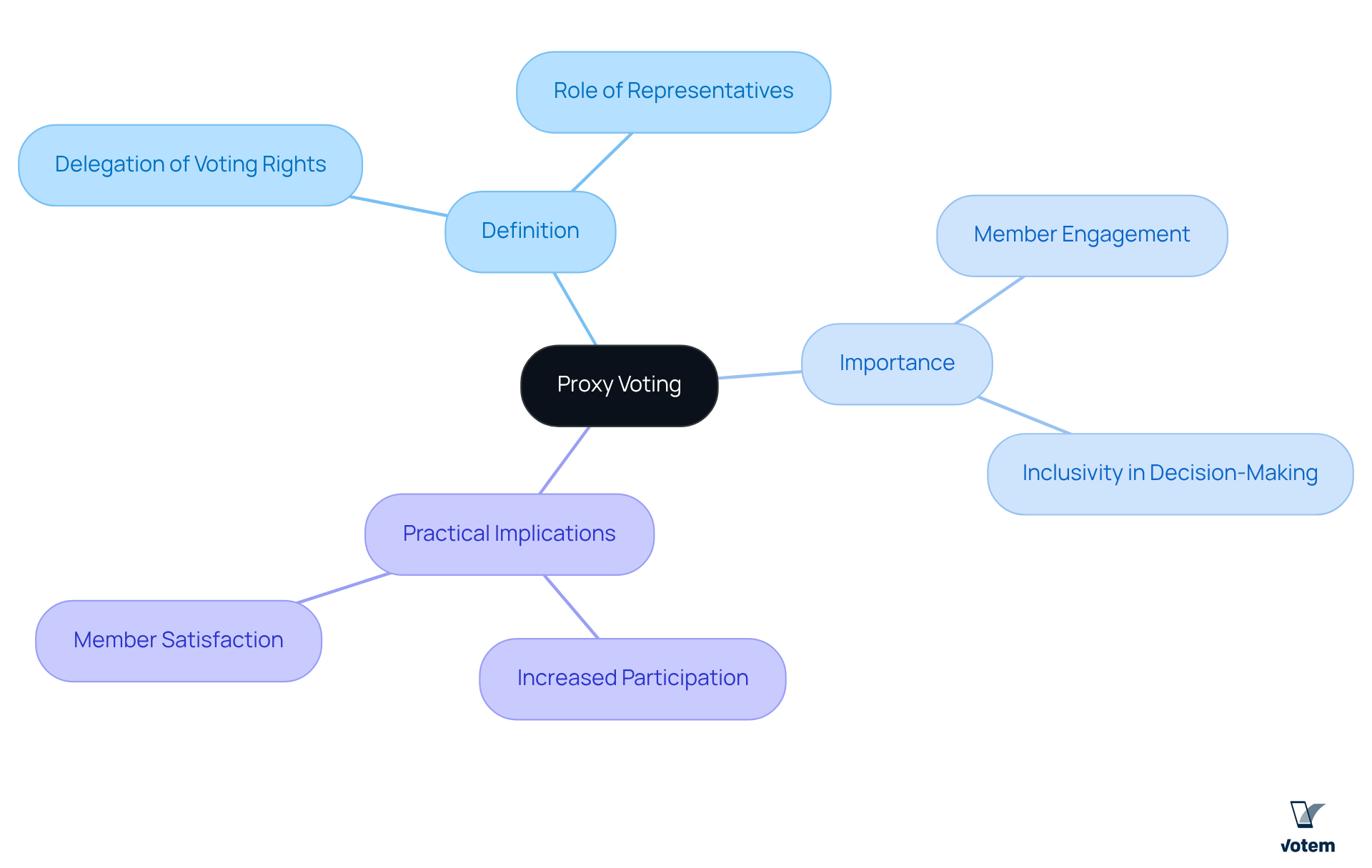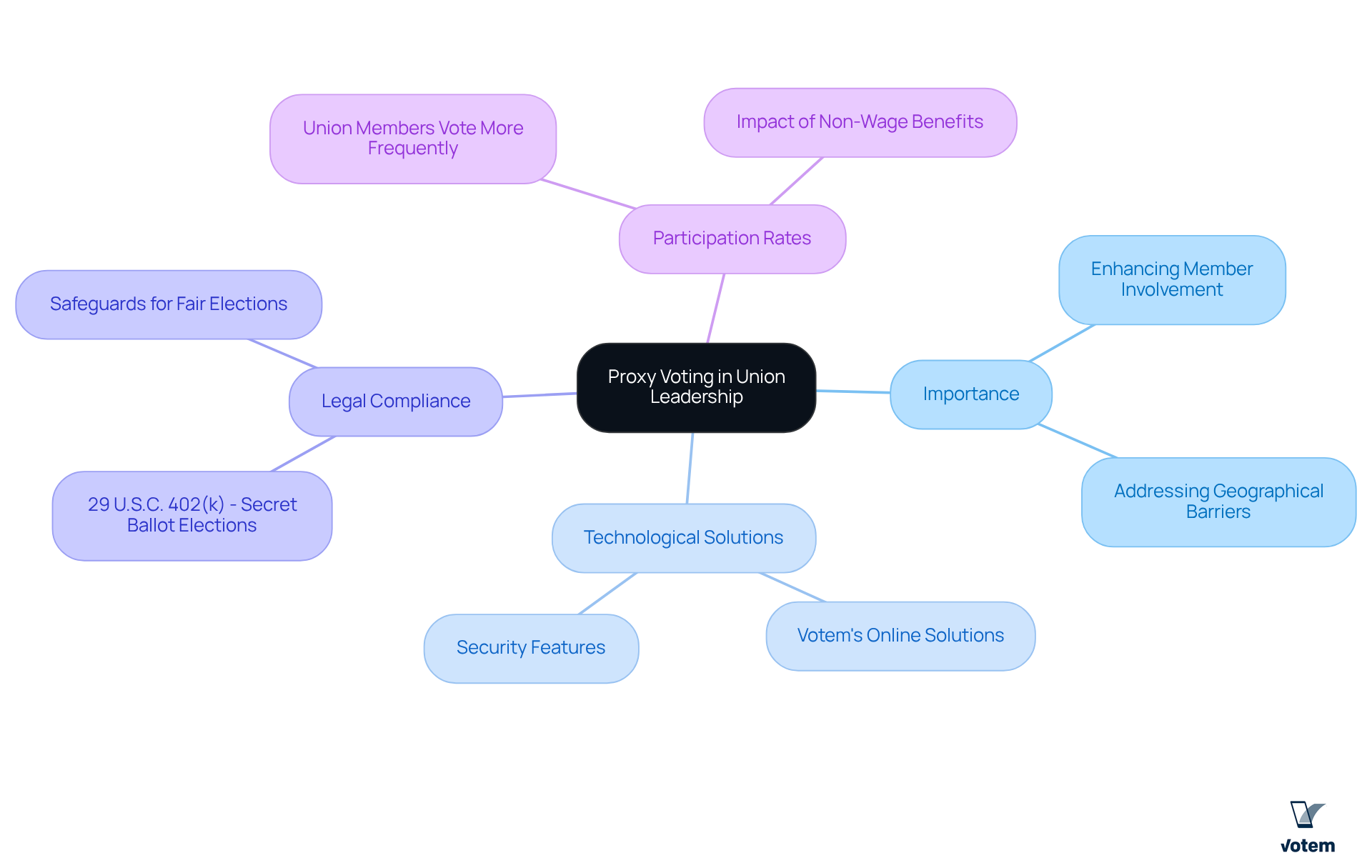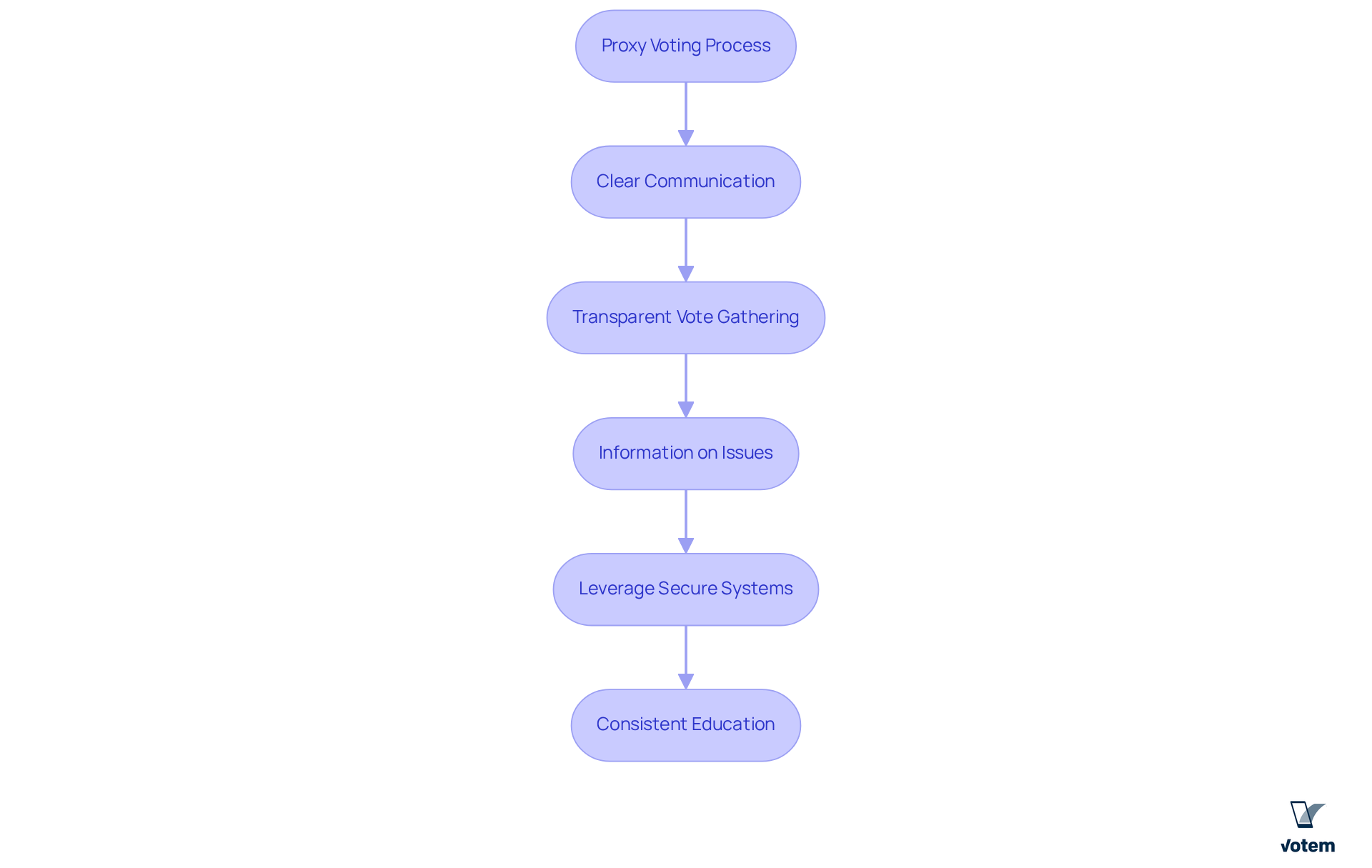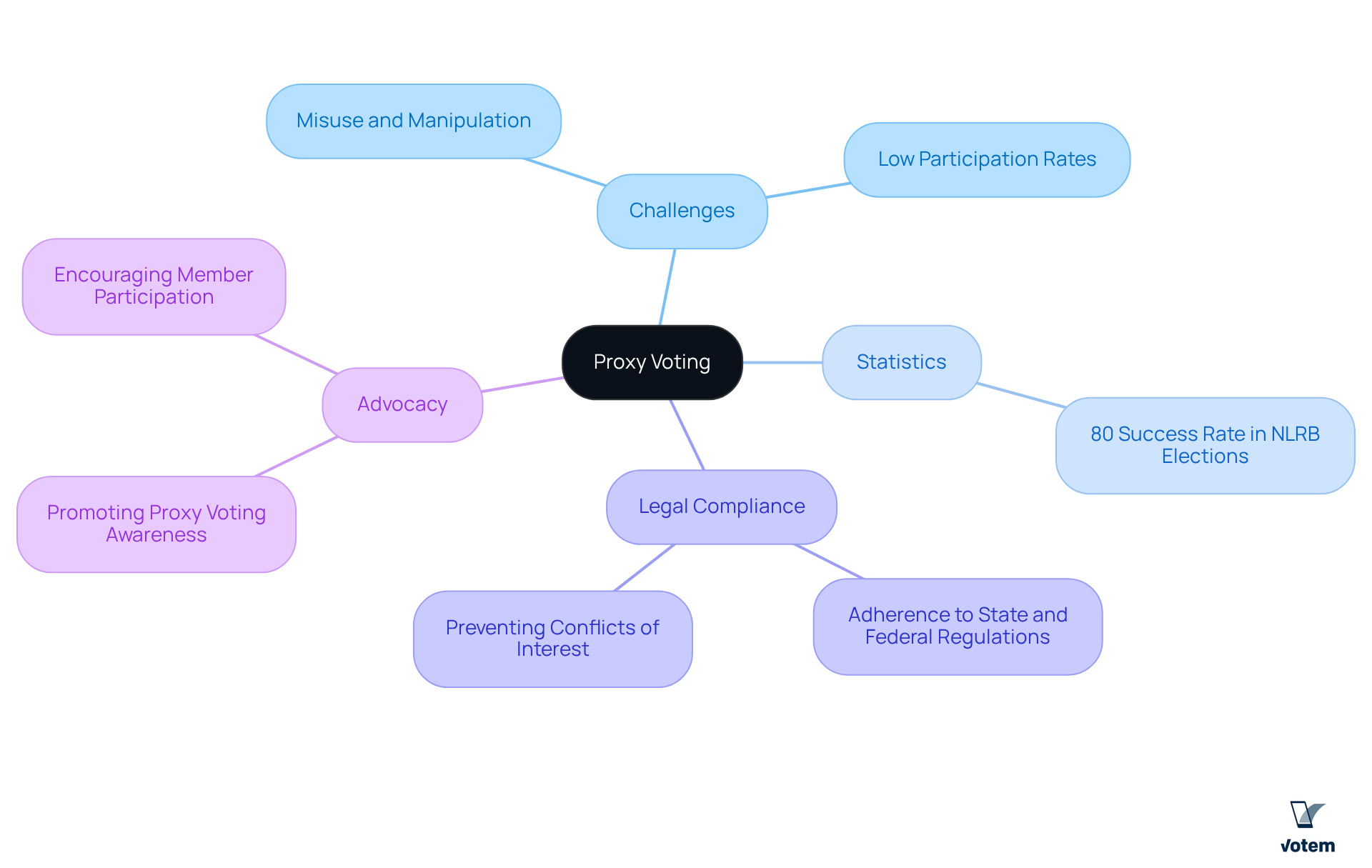Overview
Proxy voting serves as a vital mechanism that empowers association members to delegate their voting rights to representatives. This ensures participation in decision-making processes, even when individuals are unable to attend meetings. By emphasizing the significance of this process, we see how it enhances member engagement and upholds democratic practices. It allows for broader representation and effectively reflects the collective will of the membership, ultimately strengthening organizational governance.
Furthermore, the implementation of proxy voting not only facilitates increased participation but also fosters a culture of inclusivity within organizations. This approach acknowledges the diverse challenges faced by union leadership while simultaneously promoting a more engaged membership. In addition, the ability to delegate voting rights ensures that every voice is heard, contributing to a more representative decision-making process.
In conclusion, adopting proxy voting is not merely a procedural change; it is a strategic enhancement that can lead to improved organizational outcomes. Union leaders are encouraged to consider the implementation of proxy voting as a means to bolster participation and strengthen governance structures. This proactive step can significantly elevate the democratic processes within their organizations.
Introduction
Understanding the intricacies of proxy voting is essential for union leadership. This vital mechanism ensures that every member’s voice is represented in critical decision-making processes. Not only does this practice enhance member engagement, but it also strengthens the democratic framework within labor organizations.
However, the implementation of proxy voting presents challenges—how can unions navigate potential pitfalls while maximizing participation? By exploring the nuances of proxy voting, we uncover its significance and identify best practices that can lead to a more inclusive and effective governance structure.
Define Proxy Voting: Understanding the Basics
What is proxy voting? It is a critical process that allows association participants to delegate their voting rights to a representative. This mechanism illustrates what is proxy voting, allowing representatives to cast votes on behalf of individuals unable to attend meetings in person, ensuring that every voice is heard in the decision-making process. Such inclusivity is particularly crucial in scenarios where attendance may be limited, as it upholds democratic practices within organizations. Depending on the specific regulations governing the election process, the representative may be another participant of the association or an external delegate.
Understanding what is is profoundly important in labor organizations. It enhances member engagement by enabling those who might otherwise be marginalized from the decision-making process to participate actively. This inclusivity fosters a sense of belonging and investment in the organization’s direction and policies. Moreover, the effective implementation of representative ballots can lead to increased participation during elections and discussions on critical issues, ultimately reinforcing the organization’s democratic principles.
In practice, organizations that successfully utilize proxy ballots often witness heightened participation and satisfaction among their members. By ensuring that all participants have the opportunity to voice their opinions, even in their absence, associations can cultivate a more engaged and informed constituency. This engagement is vital for the health and vitality of the organization, paving the way for a robust democratic framework.

Contextualize Proxy Voting: Importance for Union Leadership
Understanding what is proxy voting is essential, as it plays a pivotal role in organizational governance by ensuring that every participant has a voice in critical decisions such as leadership selection and contract ratification. Job obligations and geographical barriers can hinder participation in association meetings, highlighting the importance of knowing what is proxy voting as an indispensable tool for enhancing member involvement. By streamlining this process, unions can more accurately reflect the collective will of their membership.
Votem’s innovative significantly enhance accessibility and security, fostering greater participation, especially among individuals who may face challenges with traditional voting methods. Labor laws, including 29 U.S.C. 402(k), mandate secret ballot elections, and representation by others is often essential to guarantee fair and democratic elections. This compliance not only safeguards individual rights but also bolsters the credibility of the organization’s leadership and its decisions, cultivating a more inclusive and participatory environment.
Furthermore, data reveals that organized workers cast their ballots 12 percentage points more frequently than their unassociated counterparts, underscoring the positive impact of representative decision-making on participation rates. To further promote inclusiveness, associations must also provide alternative voting methods for participants lacking internet access, thereby reinforcing the democratic process within the organization.

Explore Key Components: Guidelines and Best Practices for Proxy Voting
To execute representative balloting successfully, organizations must adhere to several essential guidelines and best practices. First and foremost, clear communication is crucial; participants must be informed about the voting process involving representatives, including the procedures for appointing a delegate and the timelines for submitting representative forms. In addition, associations should establish transparent methods for gathering and tallying representative votes, ensuring integrity and accountability throughout the process. Furthermore, it is imperative to provide participants with comprehensive information about the issues at stake, empowering them to make informed decisions even in their absence.
Moreover, associations should consider leveraging Votem’s secure online systems for representative ballots, which enhance accessibility and streamline the voting process, thereby facilitating participation for all individuals. Votem’s mission to strengthen and rebuild trust in elections aligns with the pressing need for . Ultimately, consistent education for association leaders and participants regarding the representative balloting procedure is essential; this effort can significantly reduce misconceptions and ensure compliance with applicable regulations.

Identify Challenges: Navigating Proxy Voting Issues and Considerations
What is proxy voting? It can significantly enhance involvement in labor elections, but it also presents substantial challenges that leaders must manage carefully. A primary concern is the potential misuse or manipulation of representatives, which can jeopardize the integrity of the electoral process. To mitigate this risk, associations must implement stringent guidelines that prevent conflicts of interest and ensure that representatives genuinely reflect the interests of their members. Furthermore, the legal complexities surrounding representative balloting necessitate that labor organizations remain vigilant in adhering to both state and federal regulations to avoid legal repercussions.
Statistics reveal that improper use of intermediaries can lead to low participation rates, thereby weakening the effectiveness of the electoral process. In 2023, the National Labor Relations Board (NLRB) reported an 80% success rate in collective bargaining elections, underscoring the importance of robust participation. To combat potential disengagement, associations should actively advocate for the significance of alternative ballot methods, clarifying and encouraging individuals to recognize that every vote is crucial in shaping the organization’s future.
Case studies illustrate the importance of legal compliance in representative decision-making. For instance, organizations that have adeptly navigated the complexities of representation have witnessed increased member confidence and involvement. By fostering an environment of transparency and accountability, unions can enhance the democratic process and ensure that what is proxy voting fulfills its intended purpose.

Conclusion
Proxy voting stands as a crucial mechanism, ensuring that every member of an organization can contribute to its decision-making processes. By enabling individuals to delegate their voting rights, proxy voting fosters inclusivity, allowing those unable to attend meetings to still play a role in shaping their union’s future. This practice not only upholds democratic values but also enhances member engagement, reinforcing unions’ commitment to representing the collective will of their constituents.
Key insights regarding the significance of proxy voting for union leadership have been thoroughly explored. The discussion emphasizes how proxy voting enhances participation, particularly among marginalized members, while illustrating the practical benefits of secure online ballot systems. Moreover, clear communication, adherence to legal regulations, and the establishment of best practices emerge as essential components for successful implementation. Addressing potential challenges—such as the misuse of representatives and legal complexities—is vital for maintaining the integrity of the voting process.
Ultimately, the effective use of proxy voting can transform the landscape of union governance. By prioritizing transparency and accountability, unions can cultivate a more engaged and informed membership. It is imperative for union leaders to champion proxy voting as a tool for empowerment, ensuring that every voice is heard and valued. Embracing this practice not only strengthens the democratic framework within unions but also inspires collective action toward shared goals, underscoring the significance of every vote in shaping the organization’s future.
Frequently Asked Questions
What is proxy voting?
Proxy voting is a process that allows association participants to delegate their voting rights to a representative, enabling votes to be cast on their behalf when they cannot attend meetings in person.
Why is proxy voting important?
Proxy voting is important because it ensures inclusivity in decision-making, allowing individuals who may not be able to attend meetings to still have their voices heard, thereby upholding democratic practices within organizations.
Who can be a representative in proxy voting?
The representative in proxy voting can either be another participant of the association or an external delegate, depending on the specific regulations governing the election process.
How does proxy voting enhance member engagement in labor organizations?
Proxy voting enhances member engagement by allowing those who might otherwise be marginalized to participate actively in decision-making, fostering a sense of belonging and investment in the organization’s direction and policies.
What are the benefits of implementing proxy ballots in organizations?
Organizations that implement proxy ballots often experience increased participation and satisfaction among members, as it allows all participants to voice their opinions even in their absence, contributing to a more engaged and informed constituency.
How does proxy voting contribute to the health of an organization?
Proxy voting contributes to the health of an organization by promoting engagement and inclusivity, which are vital for maintaining a robust democratic framework and ensuring that all members feel involved in important discussions and decisions.
List of Sources
- Define Proxy Voting: Understanding the Basics
- Unions Seek Influence in Corporate Battles (https://corpgov.law.harvard.edu/2024/06/05/unions-seek-influence-in-corporate-battles)
- Proxy Voting, Explained | Broadridge (https://broadridge.com/resource/proxy-vote-101)
- Understanding Proxy Voting: How It Works and Real-Life Examples (https://investopedia.com/terms/p/proxy-vote.asp)
- home.treasury.gov (https://home.treasury.gov/news/featured-stories/labor-unions-and-the-us-economy)
- House GOP Opens Probe Into Unions’ Proxy-Voting Activities (https://news.bloomberglaw.com/esg/house-gop-opens-probe-into-unions-proxy-voting-activities)
- Contextualize Proxy Voting: Importance for Union Leadership
- home.treasury.gov (https://home.treasury.gov/news/featured-stories/labor-unions-and-the-us-economy)
- Electing Union Officers Using Remote Electronic Voting Systems (https://dol.gov/agencies/olms/compliance-assistance/tips/remote-electronic-voting-systems)
- Federal Register :: Request Access (https://ecfr.gov/current/title-29/subtitle-B/chapter-IV/subchapter-A/part-452)
- House GOP Opens Probe Into Unions’ Proxy-Voting Activities (https://news.bloomberglaw.com/esg/house-gop-opens-probe-into-unions-proxy-voting-activities)
- Explore Key Components: Guidelines and Best Practices for Proxy Voting
- broadridge.com (https://broadridge.com/article/bbd/proxy-voting-trends-to-watch-in-2025)
- Proxy vote meaning: Complete guide to proxy voting (https://diligent.com/resources/blog/proxy-voting-guidelines)
- Electing Union Officers Using Remote Electronic Voting Systems (https://dol.gov/agencies/olms/compliance-assistance/tips/remote-electronic-voting-systems)
- corpgov.law.harvard.edu (https://corpgov.law.harvard.edu/2018/11/26/shareholder-voting-in-the-united-states-trends-and-statistics-on-the-2015-2018-proxy-season)
- House GOP Opens Probe Into Unions’ Proxy-Voting Activities (https://news.bloomberglaw.com/esg/house-gop-opens-probe-into-unions-proxy-voting-activities)
- Identify Challenges: Navigating Proxy Voting Issues and Considerations
- Workers want unions, but the latest data point to obstacles in their path: Private-sector unionization rose by more than a quarter million in 2023, while unionization in state and local governments fell (https://epi.org/publication/union-membership-data)

